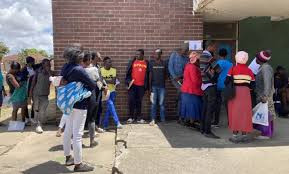
A 59-YEAR-OLD Bulawayo man is appealing for assistance to enable him to obtain a birth certificate and identity document (ID).
Many people in the Matabeleland region have approached government seeking assistance to obtain the necessary documents so that they are not stateless.
Many of them are victims of the Gukurahundi massacres of the 1980s, who say they no longer close family members to assist them to get the necessary documents as they were killed during the atrocities or died after the massacres ended in 1987.
Activists and politicians have, for years, been clamouring for government to assist people from the region to get national IDs.
Civil society organisations such as Amnesty International have also been campaigning for Parliament to act on almost 300 000 stateless Zimbabweans as they are not in the government database.
Innocent Nyoni of Robert Sinyoka, yesterday shared his troubles with NewsDay after failing to get a national ID.
“I am not educated, but I think I was born in 1966,” he said in an interview.
“My elder siblings are the ones that went to school.
- ‘Govt hiding behind Ukraine-Russia war’
- No crisis in Zim: Ncube
- ED frets over shortages
- Zim@42: Zimbos bemoan shrinking democratic space, human rights abuses
Keep Reading
“My parents did not bother to assist me to acquire a birth certificate because of lack of education.
“When I tried to do so on my own, the registry office needed witnesses, which I did not have.”
Nyoni said his children had birth certificates bearing his wife’s surname.
“I only worked as a gardener for some few years. I need money to register my children properly,” he said.
Pumula South Member of Parliament Chelesile Mahlangu said Nyoni approached her office seeking assistance to obtain identity documents.
“We are assisting a 59-year-old man who has never had access to a birth certificate,” she said.
“We went to Mpilo (Central) Hospital to look for his birth record. Fortunately, his mother is still alive (so) he will be getting his birth certificate soon.”
In Zimbabwe, it is not clear how many citizens are stateless as a result of lack of identity documents.
In international law, a stateless person is someone who is not considered as a national by any State under the operation of law.
Statelessness results in being denied birth and travel documents.
There are no exact statistics on statelessness in Zimbabwe, but research shows that about 30% of the two million former farm workers and their families were of foreign descent.
The Constitution provides for a progressive basis for addressing the issues of nationality and statelessness.
Chapter 3 of the Constitution outlines that citizenship is acquired by birth, descent or registration, especially section 43(2) which entitles persons of Sadc heritage dual citizenship.
In 2022, government launched a national civil registration blitz to issue birth certificates and IDs.
To register, people were required to provide biometric data, such as iris scans, facial images and/or other biometry and fingerprints, but they also needed to provide documents such as birth and death certificates.
However, some children of Gukurahundi victims never benefited from this exercise because they lost their relatives, family members and parents during the massacres.
Last year, Amnesty International urged the government to take measures to ensure descendants of Gukurahundi victims have access to IDs.










